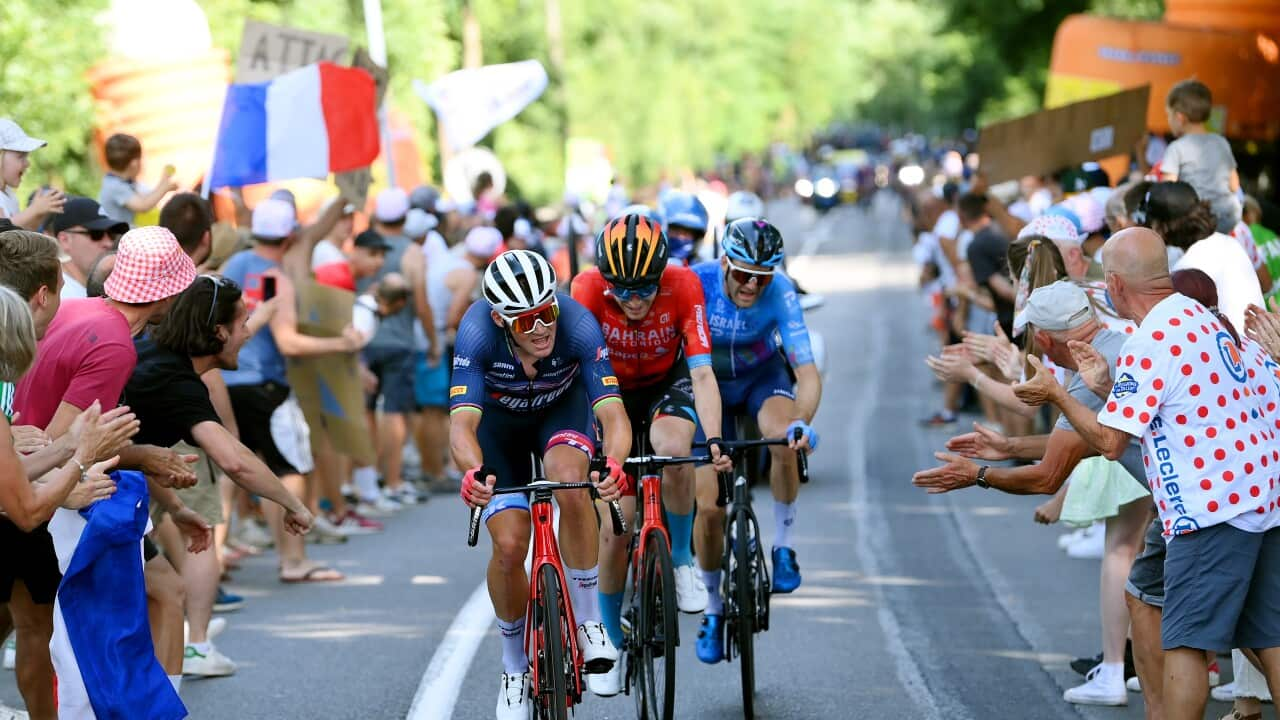A racer’s instincts
Mads Pedersen’s attack on the climb was inspired, instigating a situation where he was in control of the proceedings, rather than one where he had to be reactive to others. The only concern I had for Pedersen winning the stage was if he had to hold off surge after surge from the strong riders that were present in the move, but he anticipated that and made his own move instead.
He attacked on an uphill stretch with just over ten kilometres remaining, immediately stretching out an impressive lead. With only Fred Wright and Hugo Houle able to follow, Stefan Kung and Filipo Ganna evidently paying the price for their earlier work to establish the breakaway, it became a situation where suddenly Pedersen’s two companions were motivated to work with him rather than attack him.
As Bridie O’Donnell said in commentary, “They’ll be thinking, I was one in six, now I’m one in three”. Pedersen echoed that in the post-race interview as he explained the move. “I really didn’t want to be at the finish with six riders, it would be too many riders for me to control.”
The sprint was a formality, Pedersen both with pedigree in bunch sprints and at the end of hard races, and there was plenty of time to celebrate a memorable win.
Ewan’s ill-luck continues
Another crash for Caleb Ewan in a major race, they’ve been piling up on the Australian sprinter in recent years. This one looked like the result of a few of his teammates misjudging the corner and running wide, while Ewan himself kept a good line, his teammate in front wiping out his front wheel.
It was hard to tell from distance but the normal reaction to running wide is to straighten up and brake, and if there’s any inattention or hesitation from behind, it’s easy to crash and that’s what happened for the Aussie. It’s becoming an unfortunate trend, and it’s preventing Ewan from putting down his best efforts in the sprints.
Stage 15 to Carcassonne should be a nailed on sprint, 19 and 21 as well, and you think that Ewan needs to win at least one of those to make it a worthwhile Tour for himself and his team for everything he’s gone through.
Ewan said he was feeling really good during the stage, less so after the crash obviously, and unsure about whether there will be any ongoing problems due the fall, with most long-term problems becoming apparent post warm-down.
Breakaway battle
Stage 13 was almost a game of poker between the sprint teams and the opportunists at the start, with teams putting out attacks and seeing how keen the sprinters’ teams were to keep things together for a sprint.
The answer was a mixed one, Alpecin-Deceuninck were all-in for Philipsen, Lotto Soudal were keen to put a rider in the move if it got too large for them to shut down, and QuickStep Alpha Vinyl were curiously absent from any aggression or controlling. That may have been due to their sprinter Fabio Jakobsen falling ill or feeling the effects of the hard mountain stages, he certainly didn’t sound keen to race when he spoke to SBS at the start of the stage.
No BikeExchange-Jayco chase until it was too late
The biggest head-scratcher were the choices made by the Australian WorldTour squad, who didn’t contribute throughout the stage to the peloton’s chase, made only limited attempts to put a rider in the breakaway. Once Caleb Ewan crashed, the peloton was down a team in the chase, and with Dylan Groenewegen and Michael Matthews still in contention, the Australian in particular looking active in the crosswind sections.
The peloton even called off the chase, INEOS and Jumbo taking to the front of the bunch spread across the road to slow proceedings. They continued in that fashion as the gap stretched from two minutes up to three and a half minutes before BikeExchange-Jayco took to the front with Amund Grondahl Jansen and Jack Bauer to set a very hard tempo to try and bring their sprinters back into contention.
They brought the gap down from 3’30 to 2’30 in quick fashion, but that’s where things stalled, and you couldn’t help but think that a more consistent effort throughout the race would have paid more dividends.
Threat of crosswinds
It can be these innocuous stages in the French countryside that see the races of the GC contenders destroyed by crosswind splits. It tends to be stages where you don’t expect trouble that the most is caused, everyone was ready for the crosswinds in Denmark and northern France, all the yellow jersey favourites kept in good position by their teams, meaning that it was hard to force a meaningful split.
In Stage 13, splits were almost happening by accident with the sprint teams pacing at the head of the peloton. None of the GC teams looked to force the pace, perhaps a bit of a surprise given the potential opportunity, but there was a long way to go to the finish and a lot of teams are bringing tired legs after a series of hard days in the Alps.










